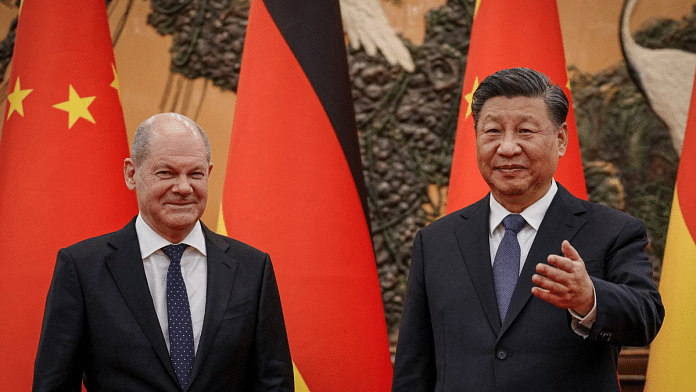China has changed”, cautions Germany’s long-awaited Strategy on China that was finally released on 13 July 2023. The 64-page document reads: “We need to change our approach to China”, align Germany with the European Union, and “coordinate it more closely with EU partners”. In March this year, days before undertaking a visit to Beijing along with French President Emmanuel Macron, European Commission president Ursula von der Leyen defined the EU’s new approach to China. Since “China has changed significantly”, the EU will seek to “de-risk” its political and trade relations with China, she said.
On paper, Berlin’s China strategy appears to echo Brussels’ de-risking ambition. If followed through, it could help Germany Europeanise its China policy. This would need a shift in Berlin’s mindset — the European power, being China’s biggest trading partner in the region, must recognise its interests in coordinating with the EU on China. In practice, however, it remains to be seen whether Berlin can advance a union-wide recalibration of EU-China relations, help address past asymmetries, and ensure a balanced future both for Germany and Europe.
To secure credible EU-wide rebalancing, however, only Germany’s readjustment will not be enough. All 27 EU member States must adjust individually and act collectively in crafting and implementing a sustainable policy on China.
Also read: Germany is undergoing end-of-an-era change. But its National Security Strategy still half-baked
EU gets tougher on China
An EU-wide consensus has emerged that the region is unequipped to protect its interests and secure its global competitiveness. EU member States’ concern is rooted in the awareness that China poses a challenge to Europe’s long-term economic sustainability, political freedom to act internationally, its values and interests, and, ultimately, to its security. This is what is believed to drive Germany’s adjustment attempts through its China strategy, Lithuania’s decision to exit the 17+1 cooperation framework with China and its turn toward Taiwan, the downward trajectory in China-Czech relations, or Italy considering an exit from China’s Belt and Road Initiative (BRI), which it had joined in 2019 as the only G7 member.
China’s political support to Russia’s war of aggression against Ukraine has intensified EU member States’ concerns. “How China continues to interact with Putin’s war will be a determining factor for EU-China relations going forward,” von der Leyen stressed during her speech. So far, there has been no sign of weakening in this unprecedented level of European unity. The EU has sought to isolate Russia by imposing massive sanctions, granted Ukraine formal candidate status in 2022, and has continued to provide financial help to Kyiv. This is an important step toward realising the Ukrainians’ European dream and a good reminder of Ukraine’s agency as a sovereign country, which Russia – and China – continue to dismiss.
While EU member States do not display such unity on China, Beijing’s strategic alignment with Moscow has forced the EU leadership to get tougher on the Asian superpower, with the European Commission redefining the bloc’s approach. In 2019, it labelled Beijing a partner, competitor, and rival, which set the parameters of a new China narrative in Brussels but failed to free the EU of inconsistencies that undermine the very unity the Commission sought to project.
As such, following German Chancellor Olaf Scholz’s November 2022 visit to Beijing with a team of 12 top-level executives, Spanish President Pedro Sánchez met Chinese leader Xi Jinping in Beijing in March 2023. A month later, Macron paid a visit with a 50-strong business delegation, along with the Commission president. Although Macron’s visit ended in a public relations debacle — for Europe, not China — it elevated von der Leyen’s strategic profile, who was praised by many, unlike the French leader.
No sooner did Macron make his controversial comments on Taiwan urging European non-intervention, Xi launched his military exercises encircling the island. And, the following day, Chinese legal scholar and dissident Xi Zhiyong was sentenced to 14 years in prison, another reminder of China’s brutal crackdown on domestic dissent.
Also read: Macron’s gaffes in China open a door for India — unwavering French support at…
What about political will?
These visits failed to bring strategic wins for the EU as a whole — in terms of improving market access reciprocity, securing human rights guarantees, or committing China to play a constructive role regarding Russia. What is certain, however, is that they gave Beijing the opportunity to cement the good old way of doing business with Europeans: Deal with member States bilaterally and bypass the complexity of the collective. This is how Xi values cooperation with the EU. Expect no change.
The point, however, is not to stop reaching out to Beijing. It is to not let China exploit engagement at the expense of everything the EU stands for as a trade bloc rooted in liberal democracy. Individual EU member States must have the political will to act as a collective. It does Europe no service to complain about China’s divide-and-rule tactic; the extent to which Beijing can divide Europe depends almost entirely on Europe itself.
Given its economic weight, Germany must lead responsibly; it must coordinate with the rest of the EU and not act alone. The question remains whether Berlin will align with the EU or prioritise its privileged access to China. But this is not a question to Berlin alone — it is one for all EU member States because, ultimately, de-risking will only work with the buy-in from all of them.
Zsuzsa Anna Ferenczy is Assistant Professor at National Dong Hwa University in Hualien, Taiwan, former political advisor in the European Parliament. Views are personal.
(Edited by Humra Laeeq)



